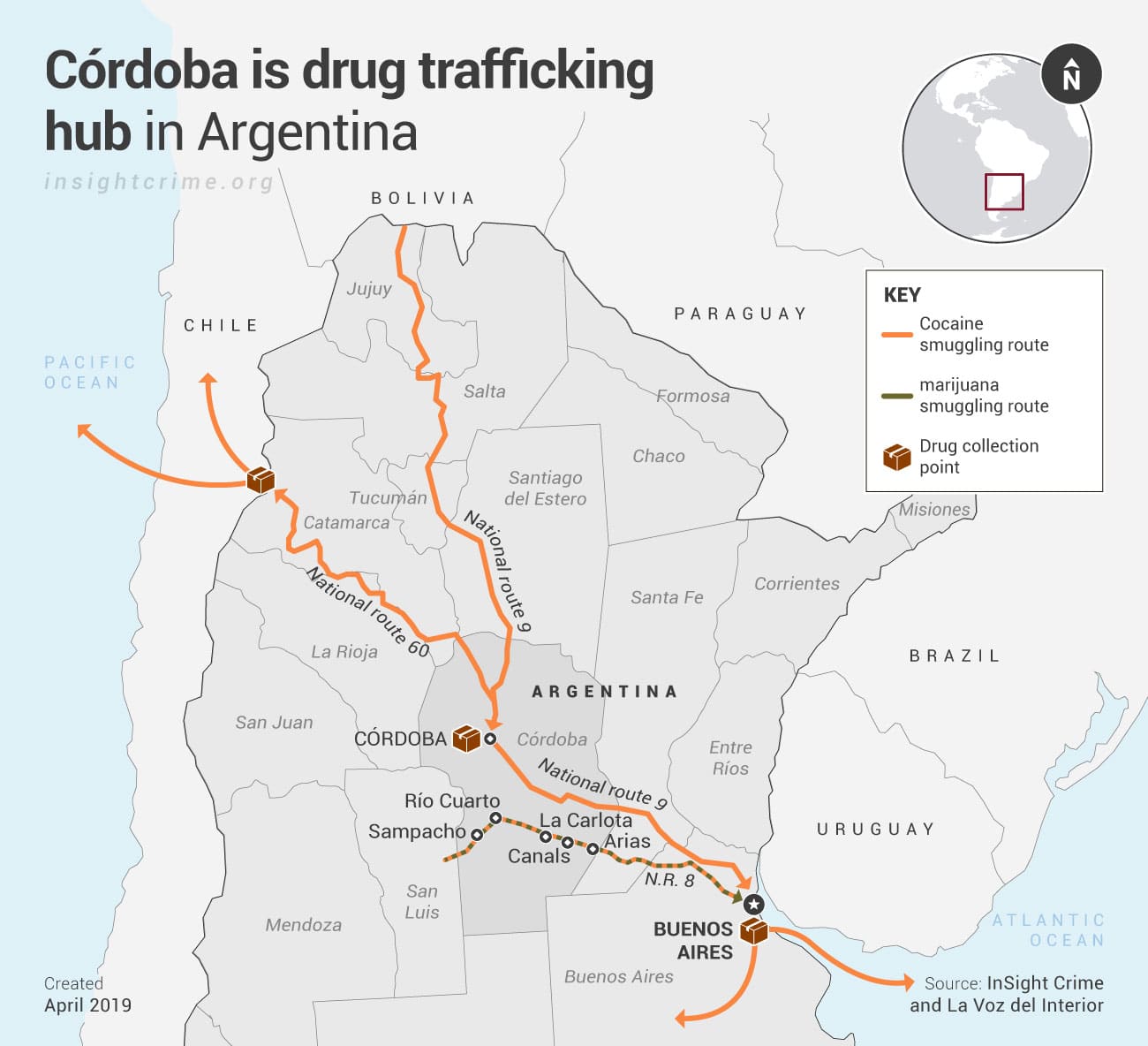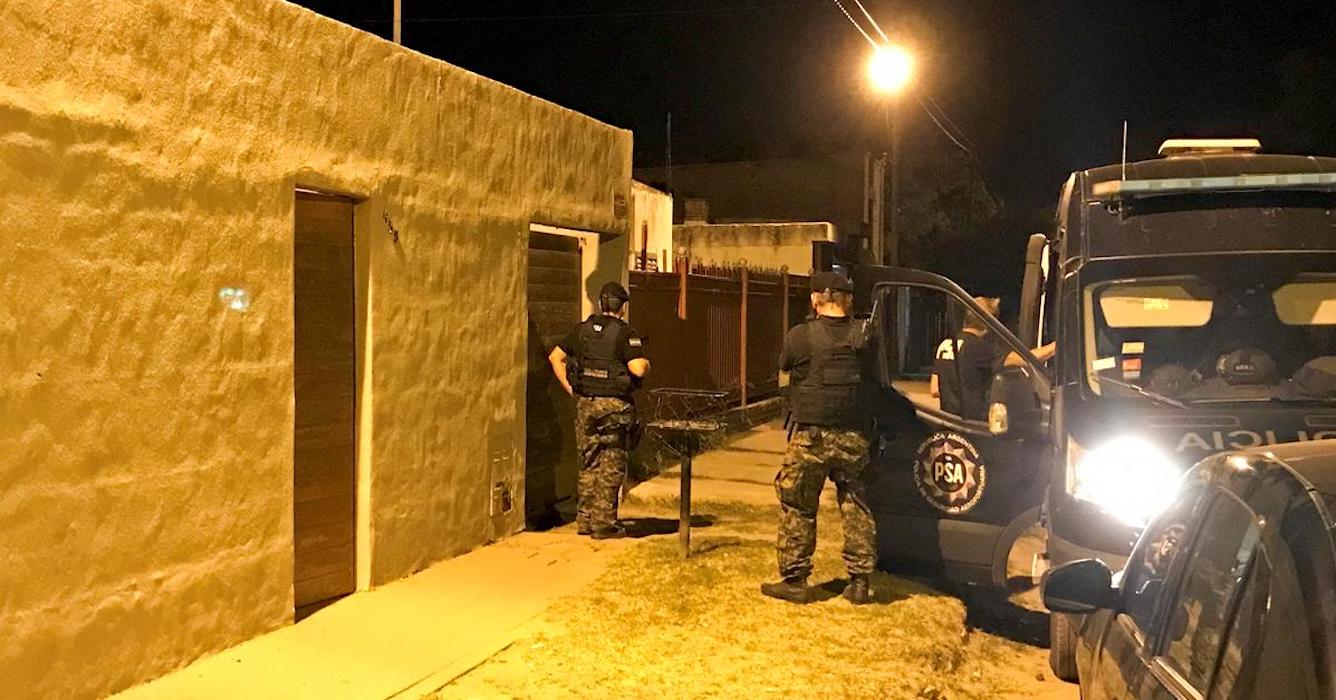The killing of a powerful drug trafficker and the arrest of a top police officer in a strategically located province of Argentina has revealed how crime groups are growing more sophisticated, running effective operations and outsmarting authorities along the way.
The story has the makings of a Netflix drama, set in one of Argentina’s most peaceful provinces.
On January 15, Claudio Torres, a 43-year-old businessman accused of drug trafficking, drove with his stepbrother Gabriel Bossi to his luxurious home in Rio Cuarto, the second major city in Argentina’s Córdoba province. Two armed men were waiting for them in a car.
According to a video of the incident, reported by La Nación, Torres didn’t even have a chance to reach for his own gun as the men shot him eight times, killing him on the spot. Bossi was injured, but survived.
The murder sent shockwaves through the largely peaceful province of Córdoba — which has one of the lowest homicide rates in Argentina, according to the Citizen Security Observatory (Observatorio de Seguridad Ciudadana).
But the unlikely wave of violence that followed the killing forced authorities to pay attention. In the first 40 days of 2019, Río Cuarto saw six killings, or 60 percent of the total homicides recorded in 2018.
The then-chief of investigations of the local police, Gustavo Oyarzábal (whose criminal record was not particularly clean) was automatically put in charge of the inquiry into the killing of Torres.
SEE ALSO: Argentina News and Profile
In the days that followed, a sweeping investigation into drug trafficking and money laundering sparked by the killings led to the arrest of dozens of alleged members of Torres’ organization, as well as seizures of cash and goods. Among those arrested were local businessmen and trade unionists.
But the most shocking twist of the story came on February 7, when Oyarzábal himself was arrested on suspicion of protecting Torres’ businesses in Río Cuarto.
This was not the first time Oyarzábal had been investigated for protecting crime groups, but it is the most damning allegation he has faced to date.
InSight Crime Analysis
The murder of Torres and the arrest of the highest-ranking police official in Río Cuarto have lifted the veil on the province’s underworld, showing just why Córdoba could be a poster child for drug trafficking.
Firstly, it’s a highly strategic location. Córdoba is at the center of cocaine and marijuana drug trafficking routes, making it highly appealing to criminal organizations looking to profit from increasing demand in Argentina and abroad.
Due to this, it serves as a link between producer countries and the Atlantic (via the National Route 9 connecting Bolivia and Buenos Aires) and has a direct route to the Pacific (National Route 60). In addition, National Route 8 connects the city of Río Cuarto with Buenos Aires, a key consumer market and distribution point.

Secondly, it has a police force that does not fight for territorial control.
“In Córdoba, the police is very vertical, it doesn’t have any internal divisions and they do not fight for territory. This is not like in Rosario, where there is more violence and where police are divided based on which [criminal] group they work with,” Juan Federico, a journalist who investigates organized crime in Córdoba, told InSight Crime.
Some light was shone on police corruption in Córdoba in 2013, when the main heads of the anti-narcotics police were prosecuted for collusion with criminal organizations.
Federico said the case was so damming to the police force that it effectively put all drug trafficking investigations on hold. Without this threat, small-time, family-run criminal organizations saw the perfect opportunity to grow.
Thirdly, Córdoba is seen as a safe haven to launder money.
“In Córdoba, drug trafficking didn’t cause a construction boom as it did in other cities. Here, that money started being injected into the economy in other, more subtle ways since 2013, so the process was not so obvious,” said Federico.
“Río Cuarto has a direct link to Buenos Aires via Route 8, it has a small airport, landing strips. There is a lot of money laundering coming from the soy industry. The fact that a new building suddenly appears does not attract a lot of attention because everybody knows money is laundered here and people tend to look the other way. It is fertile land for drug traffickers,” he continued.
This perfect storm has allowed small family clans to make money by storing drugs for transport or running “kitchens” to purify coca paste, key links in the drug trafficking chain developed by larger organizations.
“In the cases we have seen in recent years, we have identified that there are more drugs being taken by each operative, that the groups are more organized and have more money, that they outsource many of the steps. What is it that we are not seeing? Where are they placing and laundering that money,” federal prosecutor Maximiliano Hairabedian told La Voz del Interior.
The killing of Torres, a known drug trafficker in the city who had managed to run an effective organization through powerful connections in Buenos Aires and Córdoba, may have violently opened up this Pandora’s Box.
“It is believed the killing of Torres was an act of revenge from a member of his own organization that Torres snitched on to save himself. This could be a sign of fragmentation. A dynamic seems to have been broken and there seems to be some criminal reorganization which, in general, comes with violence,” Federico said.
Photo Credit: La Voz del Interior

